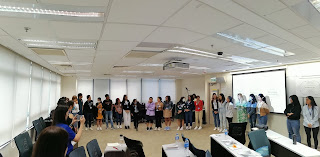On November 12, 2023, Dean Philip Arnold Tuano from the Ateneo School of Government presented thirty-two Filipino migrant workers in Hong Kong with their ALSE OF-LIFE certificates at the City University of Hong Kong. In his speech, he reminded the graduates that despite the many hurdles they faced, through their social and financial remittances to their homeland, they were still making a difference. “The overseas Filipino workers contribute to the development not only for their country but the whole world,” says Tuano.
Adjunct Professor Edgardo Valenzuela, co-coordinator of the ALSE OF-LIFE program at Ateneo de Manila University’s School of Government, addressed the graduates in his opening speech. He welcomed them to the global community of people dedicated to doing more and becoming more men and women for others.
“With new knowledge, additional skills, and a changed mindset, they join the global community of like-minded people contributing positively to the changing times,” says Valenzuela.
Prof. Mark Richard Thompson of the Southeast Asia Research Center (SEARC) of the City University of Hong Kong gave an inspiring solidarity message to the graduates. His message was much appreciated by directors of WIMLER Foundation HK, graduates, staff, and volunteers since the City University of Hong Kong hosted the classes for six months. SEARC of the City University of Hong Kong contributed to the success of the program. A proper classroom with state-of-the-art audio-visual equipment, and internet connection, provided the students with a conducive learning environment.
In his inspiring talk, Venecio Legaspi, Assistant Secretary of Reintegration of the Department of Migrant Workers, emphasized the crucial need for overseas Filipino workers (OFWs) to adequately prepare for a successful return and reintegration. He mentioned the efforts of the government to provide support to OFWs for their reintegration in collaboration with other stakeholders.
Vice Consul Allan Revote of the Philippine Consulate of Hong Kong, Welfare Officer of OWWA HK Marilou Sumalinog, and some directors of WIMLER Hong Kong also graced the event.
The attendees of the event were particularly moved by the accounts of two employers. It was a moving experience to hear them speak about their helpers and thank them for supporting their families and caring for their children. These testimonials highlighted the event in a special way.
More about ALSE OF-LIFE
ALSE OF-LIFE envisions “Filipino migrants and their families united towards supporting each other in becoming empowered and highly respected members of society, consciously contributing to nation-building.”
The ALSE OF-LIFE program began in 2008 in Rome. In 2012, the WIMLER Foundation Hong Kong brought the program to Hong Kong. Fifty students graduated from the course, the first time the course was conducted outside of Italy. In its ninth year in Hong Kong, the program aims to “empower overseas Filipino workers and overseas Filipinos to become agents of change in both the Philippines and their host countries”.
To further involve the families of migrant workers that are left behind, the ALSE OF-LIFE program was also conducted in the Philippines for them to be part of the preparation for eventual return and reintegration.
This year, the hybrid program combined face-to-face classes and online modules delivered simultaneously with other countries/cities in Asia, such as South Korea, Singapore, Thailand, Taiwan, Macau, and the Philippines.
The program was also delivered in other locations in Europe (Italy, Spain, the Netherlands, Germany, Belgium, France, Switzerland, and Russia), the Middle East (Egypt, Oman, the UAE, Qatar), North America (USA and Canada), the Caribbean, Central and Latin America (Guatemala, The Bahamas, The British Virgin Islands, Trinidad and Tobago, St Vincent and the Grenadines). As of 2022, the ALSE OF-Life Program has been delivered in 26 countries with 127 batches and a total of 4,388 graduates. Hong Kong accounts for 480 graduates from 2012 to 2019.
In Hong Kong, the program has been ongoing every year since 2012, with a three-year hiatus during the pandemic. During this time, the ALSE OF-LIFE program developed into a completely online course, which enabled it to achieve substantial growth in its global student base.
The program includes three modules: Leadership, Financial Literacy, and Social Innovation/Social Entrepreneurship, each with four modules. Classes are held twice a month over a period of six months.
Aside from these modules, a key component of the course is a Social Innovation or Social Enterprise Business Plan that the students must prepare and defend before a panel of judges. Finally, students must write a personal essay about their Ateneo LSE Journey. Upon satisfactory completion of these requirements, students are given an Executive Education Certificate by the Ateneo School of Government.
Wimler Foundation Hong Kong is supported by a core group of volunteers - ALSE alumni themselves - who were instrumental in the conduct of the program. These volunteers showed the core value of the Ateneo - being men and women for others “Ad Majorem Dei Gloriam” (for the greater glory of God).
About WIMLER Foundation Hong Kong
WIMLER Foundation Hong Kong Ltd. was officially registered in 2011 as a non-profit and charitable organization whose primary objective is to support the capacity building and empowerment of migrant communities regardless of nationalities and to promote cultural diversity in Hong Kong based on mutual respect, solidarity, and shared empowerment among peoples. In 2018, WIMLER HK was awarded the Banaag Award of the Presidential Awards for Filipino Individuals and Organizations Overseas. The awards honor distinguished individuals and foreign-based organizations dedicated to advancing the interests of Filipino communities around the world.























.png)






































